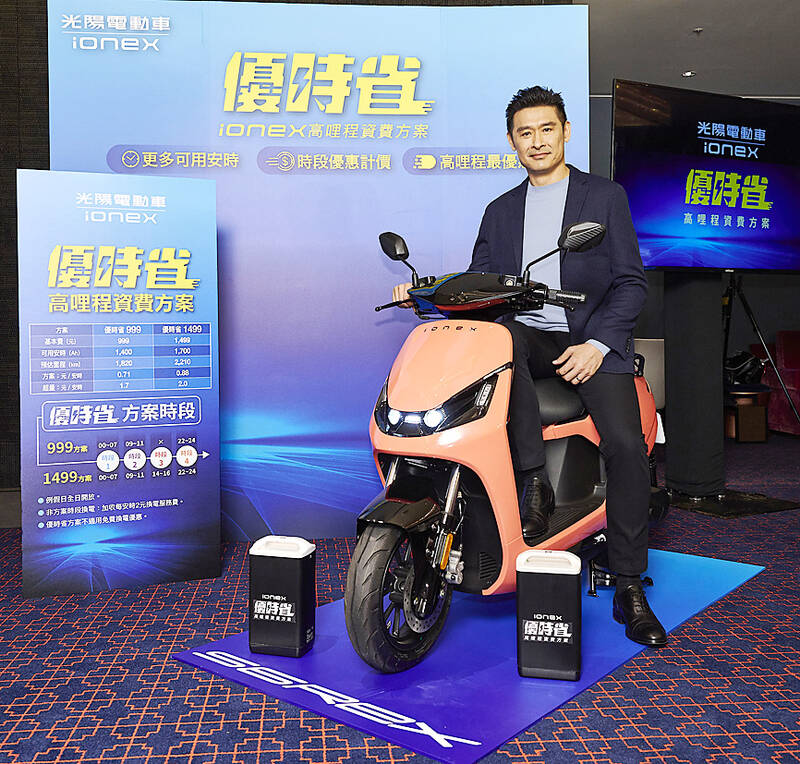Kwang Yang Motor Co (光陽工業) aims to unseat Gogoro Inc (睿能創意) as the nation’s No. 1 electric scooter vendor by 2024 on the back of rising brand awareness among consumers, company chairman Allen Ko (柯勝?) told a media gathering on Wednesday.
The company outsold its closest rival Aeon Motor Co (宏佳騰) in September and last month, becoming the second-biggest electric scooter vendor in Taiwan with a market share of 11.7 percent last month and 17 percent so far this month, thanks to robust sales of its new Ionex Air model, it said.
Kwang Yang said its performance would have been better if it were not for a chip shortage.

Photo courtesy of Kwang Yang Motor Co
The company said it is unclear when the chip crunch would ease.
“A market newcomer usually faces the disadvantage of limited brand awareness. Nobody knows you. Consumers usually go straight to the established players,” Ko said.
“I believe our electric scooter sales will leapfrog when we make a breakthrough in raising our public visibility,” he said.
After achieving its goal of securing second place in the market this year, taking the top position is the next challenge for Kwang Yang, Ko said.
“We believe we have the chance to take the top spot in 2024,” he said.
Gogoro and its partners in the Powered by Gogoro Network (PBGN) together held a market share of 80.2 percent last month. PBGN members include Yamaha Motor Co, Aeon, Motive Power Industry Co (摩特動力) and Suzuki Motor Corp.
Kwang Yang has been selling gasoline-powered scooters for more than 50 years under the KYMCO brand. The company’s fully owned Ionex Taiwan Co (台灣光捷) is responsible for producing and selling Ionex-brand electric scooters. Kwang Yang also operates its own battery swapping system, called Ionex.
The company expects to deploy about 2,000 battery-swapping stations this year and more next year.
About 6,000 people have purchased Ionex scooters since the system’s launch in 2018, Ko said.
Kwang Yang is also exploring opportunities to expand overseas. The company sells electric scooters with chargeable batteries in more than 10 countries in Europe, as it is difficult to deploy battery-swapping stations there, Ko said.
In China, Kwang Yang targets the high-end electric scooter market to avoid direct competition with major Chinese brands, which focus on low-cost electric scooters.
The company is expecting the biggest growth potential in India, Ko said, adding that the company is also in talks with potential partners to make inroads into Southeast Asian markets to build a stronger foothold there.
“We expect next year to be a wonderful year,” Ko said. “The talks are picking up pace as COVID-19 restrictions have relaxed in some countries.”
He declined to disclose details about what kind of partnerships Kwang Yang is negotiating.

NEW IDENTITY: Known for its software, India has expanded into hardware, with its semiconductor industry growing from US$38bn in 2023 to US$45bn to US$50bn India on Saturday inaugurated its first semiconductor assembly and test facility, a milestone in the government’s push to reduce dependence on foreign chipmakers and stake a claim in a sector dominated by China. Indian Prime Minister Narendra Modi opened US firm Micron Technology Inc’s semiconductor assembly, test and packaging unit in his home state of Gujarat, hailing the “dawn of a new era” for India’s technology ambitions. “When young Indians look back in the future, they will see this decade as the turning point in our tech future,” Modi told the event, which was broadcast on his YouTube channel. The plant would convert

‘SEISMIC SHIFT’: The researcher forecast there would be about 1.1 billion mobile shipments this year, down from 1.26 billion the prior year and erasing years of gains The global smartphone market is expected to contract 12.9 percent this year due to the unprecedented memorychip shortage, marking “a crisis like no other,” researcher International Data Corp (IDC) said. The new forecast, a dramatic revision down from earlier estimates, gives the latest accounting of the ongoing memory crunch that is affecting every corner of the electronics industry. The demand for advanced memory to power artificial intelligence (AI) tasks has drained global supply until well into next year and jeopardizes the business model of many smartphone makers. IDC forecast about 1.1 billion mobile shipments this year, down from 1.26 billion the prior

People stand in a Pokemon store in Tokyo on Thursday. One of the world highest-grossing franchises is celebrated its 30th anniversary yesterday.

Zimbabwe’s ban on raw lithium exports is forcing Chinese miners to rethink their strategy, speeding up plans to process the metal locally instead of shipping it to China’s vast rechargeable battery industry. The country is Africa’s largest lithium producer and has one of the world’s largest reserves, according to the US Geological Survey (USGS). Zimbabwe already banned the export of lithium ore in 2022 and last year announced it would halt exports of lithium concentrates from January next year. However, on Wednesday it imposed the ban with immediate effect, leaving unclear what the lithium mining sector would do in the